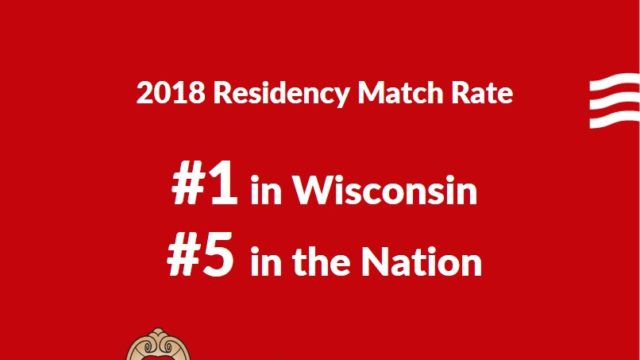
The University of Wisconsin–Madison School of Pharmacy ranks number one in Wisconsin and fifth in the country in 2018 residency match rate (PGY1).
The School’s PharmD students placed into residency programs at a rate more than 20 percentage points higher than the national average. The School’s residency match rate of 88 percent is significantly higher than the 2018 national applicant match rate of 65 percent in the American Society of Health-System Pharmacists (ASHP) Resident Matching Program.
“As residencies become increasingly competitive, UW–Madison School of Pharmacy PharmD students continue to outperform their peers in their academic excellence, leadership, and commitment to the highest levels of patient care,” says Steven Swanson, dean and professor of the UW–Madison School of Pharmacy.
“The outstanding residency match rate is a testament to the caliber of our PharmD students and the quality and strength of our top-ranked PharmD program at the UW–Madison School of Pharmacy,” adds Swanson.
The School offers several residency-track clerkships known as the Residency Track Advanced Pharmacy Practice Experience (APPE RT). Pioneering this innovative learning opportunity in 2013, the School was one of the first to offer specialized clerkships designed to prepare PharmD students for residencies in health systems.
“Nearly half of UW–Madison School of Pharmacy student pharmacists pursue residencies so we’ve developed a comprehensive approach to help ensure our PharmD students are among the most competitive in the country for post-graduate pharmacy residencies,” says Mel de Villiers, associate dean of academic affairs and professor at the UW–Madison School of Pharmacy.
Pharmacy residencies are postgraduate training after earning a PharmD degree that provide additional experience with direct patient care. As the role of pharmacists expands in health care, more hospital and clinic settings are requiring residency training for pharmacists. Pharmacists in ambulatory care, primary care, emergency room, pediatrics, and other pharmacy specialties typically have completed a residency.
Learn more about the School of Pharmacy’s Advanced Pharmacy Practice Experiences and the PharmD program.